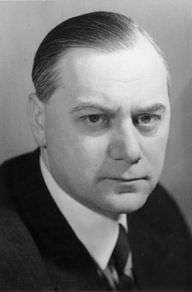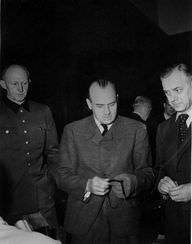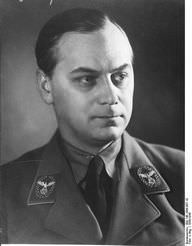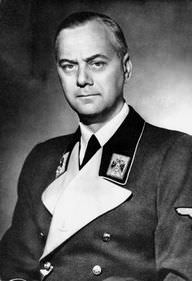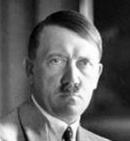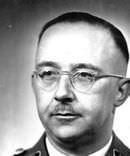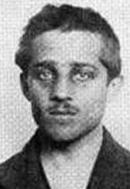Alfred Rosenberg
Estonian-German politician
Alfred Rosenberg Rank
About Alfred Rosenberg
Alfred Rosenberg was a politician, a firm believer, and an activist of N--ist theory and philosophy. Rosenberg worked alongside famous politicians such as Adolf Hitler. Alfred played a very significant role in the N--i movement as he was the head of Foreign Affairs during the era of N--i Germany. He was also the leader of ‘Rosenberg's bureau’, another N--i movement organization that pushed for education on cultural policy.
Background
Alfred Rosenberg grew up in Reval, the capital of modern Estonia, His mother, Elfriede, was of German and French ancestry, and his father Woldemar Wilhelm Rosenberg, was a tradesman.
Family
Rosenberg was involved with two women his entire life. Hilda Leesmann (divorced) and Hedwig Kramer. Kramer stayed with him till his death, the couple had two children, a boy who died shortly after birth and later a daughter - Sheila who was Rosenberg's only child and heir.
Education
Rosenberg is a graduate of the Tallinna Reaalkool formerly known as ‘Petri-Realschule'. He studied architecture at the Riga Polytechnical Institute and then went on to study engineering at Moscow's Higher Technical School where he was finally awarded a Ph.D.
Career Highlights
Painting
Throughout his stay in Reval, he went for lessons and studied under Ants Laikmaa – a popular painter at the time.
Writing
Rosenberg has authored several books and manuscripts on N--ism, he is widely noted for producing literature that promotes racism, and the persecution of the Jews as he so believed that they are feeble-minded. His dire hatred for Christianity was displayed many times in his work.
Books
As a N--i activist Rosenberg's books followed a common trend. His book "The Crime of Freemasonry: Judaism, Jesuitism, German Christianity" revealed his ideology about Christian religion and his distaste for Jews concurrently.
"Principles, and goals of the National Socialist German Worker's Party" is another one of his pieces that witnessed both affection and criticism as some readers including his fellow N--ists insisted his book was full of mediocre judgment.
Teacher
The German politician did not only carry out his activism in books he also impacted his great deal of political knowledge to other individuals. Rosenberg served as a teacher at the Gustav Adolf Gymnasium.
The Greater Germans People's Community
After parting ways with Hitler, Rosenberg carried on with his German superiority agenda. He founded the Greater German People's Community, an organization that strongly held on to N--ism. The organization had its headquarters in Munich. The organization became a home for N--ists in the locality as its people were mostly socialists.
Racism
During a time when n--ism dominated Europe, Rosenberg saw to it that racial discrimination gained ground by preaching and implementing his racial tenets amongst the German superiors.
Rosenberg built his philosophies around the ideologies of his mentors which included Stewart Chamberlain, Madison Grant, and on special occasions Hitler.
Rosenberg publicly exhibited his dislike for the Jews and the black race as he placed them beneath the racial ladder. He in effect promoted the Nordic theory which showcased the Nordic race as superior. Nicknaming them the "master race" placing them before Indo-Europeans as well.
Trial and Sentence
Rosenberg was carrying out his N--ist duties when Allied troops seized him in Flensburg-Mürwik.
He was imprisoned and prepared for trial at Nuremberg. Rosenberg was adjudged guilty of four crimes, which are listed below:
- conspiracy to commit crimes against peace
- Planning, starting, and waging war
- Spearheading war crimes
- And finally, masterminding crimes against humanity
During his trial, he was acclimated as one of the principal planners of the invasions of Norway and the Soviet Union - Now Russia. This accusation also made him liable for the plundering and destitution of many countries in Europe.
Death
Rosenberg was executed with other convicted colleagues at Nuremberg Prison on 16 October 1946.
Trivia
Franz Szell, a Jewish journalist, wrote that Rosenberg had “no drop of German blood" flowing in his veins. This accusation was however boycotted as Rosenberg's mother was German.
Rosenberg made his first public appearance on 30 November 1918 where he spoke about Jewish Marxism at the House of the Blackheads.
During his trials, Rosenberg's diary was translated by Harry Fiss, Head of Documentation at the American prosecution.
Rosenberg's Diary now serves as an artifact in the United States Holocaust Memorial Museum in Washington.
Robert King Wittman, a Former Federal Bureau of Investigation agent, who aided in the recovery of Rosenberg's diary, attested to the fact that, that the diary never paragraphed Rosenberg or Hitler stance on killing or getting rid of the Jews; all the dairy recorded was that the two had required that they be moved out of Europe.
Alfred Rosenberg Rank
Alfred Rosenberg photo gallery
F.A.Q. about Alfred Rosenberg
When is his birthday?
Alfred Rosenberg's birthday is on January 12, 1893.
In how many days is his birthday?
Alfred's birthday is in 340 days
How old was Alfred when he died?
He was 53 years old.
When did he die?
He died in October 16, 1946.
How old would he be today?
Alfred Rosenberg would be 132 years old if he was alive today.
Where was Alfred from?
He was born in Revel, Governorate of Estonia, Russian Empire.

